- Home
- C. R. Daems
The Riss Gamble
The Riss Gamble Read online
THE RISS GAMBLE
by
C. R. Daems
WHISKEY CREEK PRESS
www.whiskeycreekpress.com
Published by
WHISKEY CREEK PRESS
Whiskey Creek Press
PO Box 51052
Casper, WY 82605-1052
www.whiskeycreekpress.com
Copyright Ó 2011 by C. R. Daems
Warning: The unauthorized reproduction or distribution of this copyrighted work is illegal. Criminal copyright infringement, including infringement without monetary gain, is investigated by the FBI and is punishable by up to 5 (five) years in federal prison and a fine of $250,000.
Names, characters and incidents depicted in this book are products of the author’s imagination or are used fictitiously. Any resemblance to actual events, locales, organizations, or persons, living or dead, is entirely coincidental and beyond the intent of the author or the publisher.
No part of this book may be reproduced or transmitted in any form or by any means, electronic or mechanical, including photocopying, recording, or by any information storage and retrieval system, without permission in writing from the publisher.
ISBN 978-1-61160-054-4
Credits
Cover Artist: Gemini Judson
Editor: Dave Field
Printed in the United States of America
Dedication
To my wife Verina for her patience and understanding.
Chapter 1
“This could be the worst day of my life,” I shouted, glaring at the black-wrapped package with the yellow-sunburst emblem of the Sadr Alliance of Stars (SAS). I’d waited six agonizing months for a response to my application for admission to the Riss Project. Acceptance meant a college education, commission in the SAS Navy, and partnership with an alien. Now that it had arrived, I’d rather dismantle an explosive device than open that package.
“Do you know the odds that I was accepted? Do you even care?” I pointed an accusing finger. “There are about a hundred billion people in the SAS. If only one out of ten thousand is eligible, and of those, only one out of every hundred is interested, one hundred thousand individuals submitted applications. The proposal stated there are ten positions; therefore, my chances are one in ten thousand.”
I tore my gaze away from the package. I’d dared to dream; now the dream lay on the table crushed beneath that black-wrapped packet. I’d hoped to see the stars. That had been a fantasy. I would never leave Corona. I was born here and would die here. Not that my life was bad. I had a good job, which was challenging and paid well.
I scanned my apartment with some satisfaction. The room had a comfortable living area, small but adequate kitchen, modern Kleanzer, and separate bedroom. I had a unique voice-activated computer system I designed and built, which controlled the apartment’s security, lights, accessories, and appliances. The kitchen was large enough for a small table, currently occupied by the package I was trying to ignore. Mentally exhausted, I set the Kleanzer to hot and stood there until I turned pink, then dragged myself to bed.
* * * *
Reconciled to staying on Corona, I dressed, used the Fugenie to make a breakfast of potato pancakes, and sat at the kitchen table, watching the daily news. I had thrown the package on the couch—out of sight out of mind. Nothing interesting had happened while I slept, which wasn’t unusual on Corona. After a second cup of Corona kaffa, I dressed and left for work. The repair shop I worked at was a convenient five-minute walk past apartment complexes, large equipment manufacturing and assembling plants, and repair facilities. The landscape, roads, warehouses, shuttles, and landing tarmac were a ubiquitous gray. Even the town looked gray and dingy in the early morning overcast sky. They matched my mood.
* * * *
“Good morning, Nadya. Karl tells me he delivered a package to you from the SAS yesterday. Bad news?” Phil asked. The usual smile on his pudgy round face was missing. He was a big man, in height and girth, and owned the repair facility where I worked. On my uncle’s recommendation, he’d hired me after I’d finished compulsory school. I’d been fourteen years old.
“I haven’t opened it yet.” I wanted to ignore the subject, but Phil wouldn’t let me. He’d encourage me to “get it on the table and deal with it.” It was currently on the table, and dealing with it was the problem.
“Why? I know you did well on your tests. I talked to the mayor, who reviewed your test results. He said your scores were outstanding. And I said nice things about you, even though I don’t want to lose you.”
“Thanks, Phil. I’m happy here and love my work. I’d just like to see the stars.”
The SAS required the tests be strictly monitored over the five days it took to complete. To my delight, they were predominately problem-solving and mathematical exercises. In addition, there were required evaluations by the person you worked for, planet security, and your parents or guardian, which in my case was my uncle. I couldn’t help but wonder if other candidates had been permitted to take the test unsupervised or had been helped.
“You know you’ve a future here. I know most of the workers regularly go to you for advice on how to fix something or other. Someday, you’ll be the supervisor here. You would be today, except for your age.” Phil chewed on his lower lip. “I want you to go home tonight and open that package. You can’t move on until you know—for sure—what it says.”
“Thanks, Phil.” He was right. The package wasn’t something I could take apart and fix. I excelled at that. Unfortunately, it didn’t need repair. When my parents died in a shuttle accident, my aunt took me in. With four children of her own, she didn’t have spare time for me. I became a loner and turned to taking things apart. If I wasn’t caught while it was still apart, I usually managed to put it back together. My uncle saved me. A design engineer, he took pity on me. He didn’t help my social skills, but he encouraged my natural inquisitiveness. Even at work, I was a loner, content to spend hours learning how things worked and how to repair them.
* * * *
I still procrastinated. After work I went into town and ate dinner at one of the local restaurants. Afterward, I walked around the shops looking for an excuse to stay out. In the end, I gave up and returned to my apartment.
I placed my hand on the door pad and the door slid open.
“Rika.”
“Yes, Nadya,” my computer responded cheerfully.
“I’m depressed, so don’t sound so damn happy.”
“Yes, Nadya.” However, her voice didn’t change. I vowed to program another less cheerful voice.
“Security on, front room lights on medium, list messages.” I closed the door and glared at the black-wrapped package, which ignored me.
“Messages from Carola, Fredand, and Lenda,” Rika said in that damn cheerful voice.
“Ignore.”
I picked up the package from the table. Refusing to look at it, I gazed up at my only two pictures—a spiral galaxy and a globular cluster set against the star-studded blackness of space. It epitomized my life’s dream, since I was six-years-old. Accepting that my youthful dreams would never come true, I ripped open the package.
With my vision blurred by tears, I stared at the letter on the top of the pile of contents. Throwing it on the table, I rubbed my eyes with my shirtsleeve, walked over to the fridge, and grabbed a bottle of Eden dark-beer. I deserved a drink; it had been a bad day. I seldom got drunk, but I needed to dull the lump in my chest. Wandering back to the table, I took a swig of beer and glanced at the letter, now splattered with tears. It didn’t say “No Acceptance.” A teardrop had obscured the “tice of.” It read “Notice of Acceptance.” I jumped up, knocking the chair over, and whirled around the room. When I got control of myself, I picked up the lett
er and read it. Three hundred applicants had been selected for further consideration. My odds had improved from one in ten thousand to one in thirty.
I’d be competing against candidates from the hundreds of colonies belonging to the SAS. My stomach knotted at the thought. They would be well educated, extremely intelligent, and have diverse experience. Conversely, I had a compulsory level of education; my knowledge limited to troubleshooting and repairing equipment; and my worldly experience a small mining colony. But I’d been accepted. I’d ride on a spaceship, have an opportunity to see the capital of the SAS, Eden, and a chance to compete for one of the coveted ten slots. Despite my fears, I vowed to be one of the ten.
* * * *
Two weeks later, I stood outside the Xundex city control tower with my meager possessions in two cloth bags. I watched as a silver navy shuttle settled onto the tarmac. The door opened and four men in white uniforms exited. The officers were somehow the same, yet different. Their height, build and faces varied, but their mannerisms and the way they carried themselves made them look like clones. Three of the men entered the building; however, one stopped and scanned me like some new kind of bug. I guess I didn’t look impressive, since he shook his head.
“Are you Nadya Reese?” His voice was gruff and loud, as if talking loud would help me understand him.
“Yes, Sir.”
“You don’t look old enough... Never mind. You can wait in the shuttle. Sit in the back.” He turned and followed the others into the building. I staggered to the shuttle, carrying one bag and dragging the other. My instructions limited my luggage to forty-five kilos, which weighed five kilos more than me. Halfway to the shuttle a short petty officer with a big smile walked out to meet me.
“Here, let me help you, Miss. The Lieutenant doesn’t believe officers should have to do manual labor. My name’s Greg.” He hoisted the bags off the ground with ease and began walking towards the shuttle. I could have kissed him, except I was too exhausted.
“Thanks, Greg. I’m Nadya,” I said between gasps. He stored my luggage in a back compartment and waved me into the shuttle.
“I’m afraid it’ll be a while before we leave. We’re dropping off medical equipment, and the medical officers are here to explain its operation. The other officers will be evaluating the colony’s requests for assistance. We’ll also be loading VIPs like you needing transportation to any planets on our schedule.”
I almost tripped. In an instant, I’d gone from a young girl of little consequence to a “Very Important Person”.
“Take a seat in the back and get comfortable. I’ll bring you a cup of kaffa or taffa.” Kaffa was made from beans grown on several planets; taffa was kaffa with Twill leaves, which produced a euphoric effect.
“Kaffa, please.”
Greg was short and stocky in a muscular way. I guessed his normal duties involved handling cargo. Not a trivial job if he also managed the load distribution. I liked him. A few minutes later, he returned with a cup of kaffa. He sat with me, sharing information about the navy. The time went quickly, and before I realized it, the officers were boarding along with a well-dressed civilian, who I didn’t recognize. He was obviously a VIP, but then so was I. I ignored the fact that he was sitting up front, while I was in the back.
When I found I was going to Eden, I’d expected to be picked up by a merchant ship and required to work for my passage. Instead, I was going to be transported on an SAS War-class ship, the Goshawk. I knew the navy was well liked; however, I hadn’t realized the magnitude of services they provided. Greg had explained how the navy had originally been organized to defend the alliance against aggressors and raiders. Today, the fleet spent the majority of its time supporting the many far-flung colonies of the SAS. They delivered and installed planetary defense and medical equipment, conducted training, consulted on repairs to machinery and ships, delivered supplies, and provided transportation for VIPs. In this case, the ships were stopping at specific planets to pick up and transport Riss Project candidates.
I stopped to look around the shuttle, which I hadn’t done while Greg entertained me. The shuttle looked designed to carry twelve persons in comfort. The seats were large, well-cushioned, and covered in a soft leather-like synthetic material. I kept pinching myself, hoping this wasn’t just a wonderful dream.
The shuttle vibrated slightly as it lifted off the tarmac. As it rose, the mines, the warehouses, and Xundex city grew smaller, until the people began to look like ants and the massive yellow earthmovers like toys. As I watched, the Goshawk came into view. From the ground, the spaceship was little more than a star-like speck in the sky. Up close, it looked like a small city. In my excitement, I’d forgotten to breathe. I closed my eyes and sucked in a deep breath.
As we approached the ship, the shuttle slowed and seemed to be pulled into a huge open cavern, containing a variety of other shuttles. When the red light over the door turned green, the officers and VIP rose and exited. Unsure what to do, I followed. When I reached the bottom of the ramp, a young woman approached.
“Miss Reese?” She was a head taller and dressed in blues. “I’m Petty Officer Nelsen.”
“I think so... Sorry. I’m having this wonderful dream and not sure who I’m supposed to be,” I said, while gaping around the bay. It was enormous. At present, I could only see three shuttles, but it looked like the bay could easily accommodate ten. People were scurrying everywhere.
The young woman laughed. “Don’t feel bad. I had the same feeling when I first boarded the Goshawk. It’s a small city. There are over a thousand navy and army personnel aboard. If you’ll follow me, I’ll give you a quick tour of the passenger’s wing where you’ll be staying and show you to your sleeping quarters.”
I followed her as she navigated the hallways and elevators. She pointed out the navy’s mess, which had a separate area in the officer’s section for civilian passengers. The tables were covered with white tablecloths and chairs padded in a light blue material. The petty officer told me, if I wanted, I could get something to eat at any time using the Fugenie. Further along there was a computer and exercise room. By the time we reached my assigned room, I was exhausted.
“Are you all right? You look pale.”
“I don’t know what’s wrong. I feel like I’m going to pass out.” My head whirled and every muscle in my body ached.
“Let me help you. I’ll take you to the dispensary and have a doctor examine you.” She put my arm around her neck and half-carried me down a maze of hallways. It seemed like hours before she stopped and opened a door to a room smelling of antiseptics. She sat holding me, until a tall man in a white jacket and with a stethoscope draped around his neck approached.
“What’s wrong...Nelsen?” he said after looking at her nametag.
“Miss Reese just joined us from Corona. She’s one of the Riss candidates.”
He laughed. I didn’t think it was funny.
“All SAS ships maintain one Eden standard gravity. What did you weigh on Corona, Reese?”
“Forty kilograms.”
“On this ship and on Eden, you weigh…” He paused. “Approximately fifty-two. You just gained twelve kilograms. I prescribe lots of exercise. I’ll send you a list with the recommended number of times each day. For now take everything slowly.”
* * * *
The six-person room soon filled as we stopped to pick up Riss candidates. I turned out to be the youngest of the group and was overwhelmed, surrounded by so many gregarious people. After surviving the initial shock, I found the candidates friendly and the atmosphere convivial, in spite of us being competitors for the coveted ten positions. I enjoyed the opportunity to learn first hand about the customs, geography, and real-life stories of the people on a variety of SAS planets. From two boys who had brothers in the service, I learned that people enlisted in the navy and army for a variety of reasons: a thirty-year career with a life-long retirement, a four-year enlistment to obtain skills training towards a civilian profession, for a militar
y career at one of the planet’s garrisons, and to get away and visit the colonies.
It turned out that I was the only one who needed to exercise every day, although others did work out.
After our last stop before Eden, the Executive Officer—XO—gave us a guided tour of the Goshawk. The War-class ship eclipsed my wildest imagination. It massed seven hundred million kilos, maintained a navy crew of nine hundred, and an army brigade of one hundred fifty Airborne Commandos—Red Berets—referred to as Wasps.
I felt like dancing through the corridors and singing at the top of my lungs, but restrained myself, since that probably would have gotten me disqualified before I reached Eden. No matter how hard I tried, however, I couldn’t keep a perpetual grin off my face.
Every night I dreamed of being an officer on the Goshawk, and I dreaded its arrival at Eden. There I’d be subjected to more testing and worrying. During the flight, I found my competition represented the crème de la crème of the colonies and wondered how I’d been selected.
We arrived at Eden’s space-docking terminal Hercules, late at night, and quickly loaded into shuttles. Our flight took us over Eden city, a major metropolis with a population of over twenty million. I stared, giddy with excitement. The buildings soared to dizzying heights, and the city twinkled like my picture of a spiral galaxy. I hoped someday I’d have a chance to explore the city. For now, we were sequestered in shuttles and headed away from the lights. Nevertheless, it made for an exciting adventure.
We landed on a small pad next to a three-story building made of a white-looking marble, which shimmered under the light of a full moon. The entrance was a semicircle with two wings, flaring out on each side like a bird in flight. It seemed strange that there were no other houses or buildings, judging by the lack of lights. Two Red Berets stood guard in front of the entrance and two more inside. The foyer ceiling rose to the top of the third floor and gave a sense of being outdoors. We were met by several navy officers and led into a large auditorium. There we learned that the complex, known as Zann House, had been built exclusively for the indoctrination and selection process.

 The Phoenix Wars: Book I, Reprieve
The Phoenix Wars: Book I, Reprieve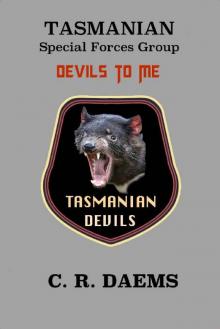 Tasmanian SFG, Book II: Devils to Me (Tasmanian series 2)
Tasmanian SFG, Book II: Devils to Me (Tasmanian series 2)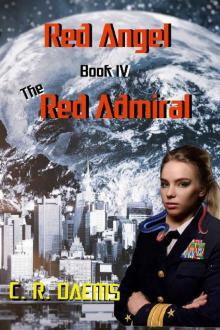 The Red Admiral
The Red Admiral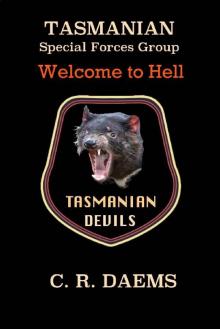 Tasmanian SFG: Welcome to Hell
Tasmanian SFG: Welcome to Hell Megan
Megan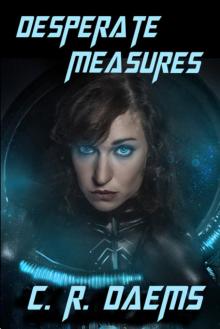 Desperate Measures: The Issog
Desperate Measures: The Issog Red Angel: Coup d'etat (Red Angel Series Book 5)
Red Angel: Coup d'etat (Red Angel Series Book 5) The Shadow Ryana (The Shadow Sisters Book 1)
The Shadow Ryana (The Shadow Sisters Book 1) Riss Series 5: The Riss Challenge
Riss Series 5: The Riss Challenge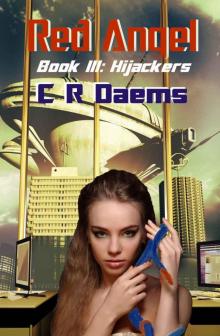 Red Angel: Book III: Hijackers
Red Angel: Book III: Hijackers The Riss Proposal: Book II in the Riss Series (Volume 2)
The Riss Proposal: Book II in the Riss Series (Volume 2)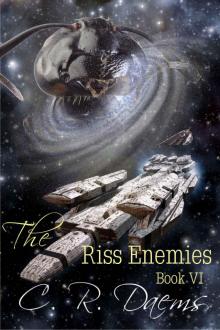 The Riss Enemies: Book VI (The Riss Series 6)
The Riss Enemies: Book VI (The Riss Series 6)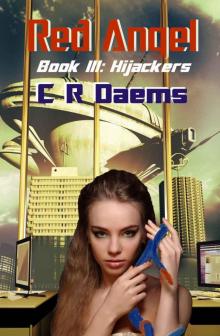 Hijackers
Hijackers The Shadow Gypsy (The Shadow Sisters)
The Shadow Gypsy (The Shadow Sisters) The Seer Renee
The Seer Renee Kazak Guardians: Book III: Megan (Kazak Guardians Series 3)
Kazak Guardians: Book III: Megan (Kazak Guardians Series 3)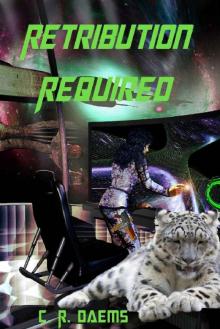 Retribution Required
Retribution Required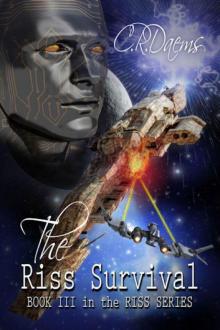 Riss Series 3: The Riss Survival
Riss Series 3: The Riss Survival The Riss Gamble
The Riss Gamble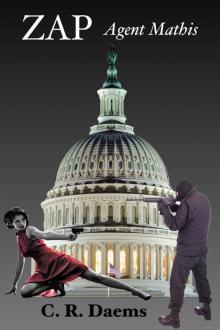 ZAP Agent Mathis
ZAP Agent Mathis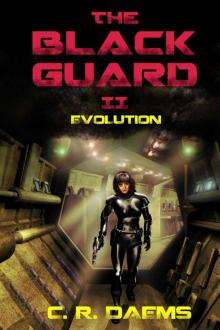 The Black Guard: Book II: Evolution (Black Guard Series 2)
The Black Guard: Book II: Evolution (Black Guard Series 2) Zara the Wolf
Zara the Wolf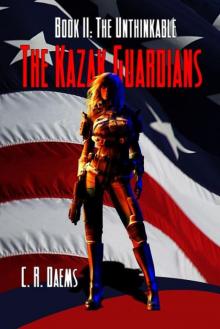 C.R. Daems - Kazak 2 - The Unthinkable
C.R. Daems - Kazak 2 - The Unthinkable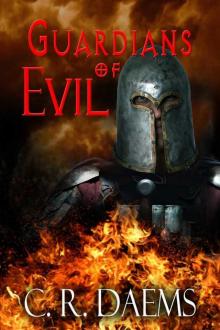 Guardians of Evil
Guardians of Evil Red Angel: Book II: Raiders (Red Angel Series 2)
Red Angel: Book II: Raiders (Red Angel Series 2) Talon of the Unnamed Goddess, a Fantasy Adventure
Talon of the Unnamed Goddess, a Fantasy Adventure Red Angel
Red Angel Women of Power
Women of Power Scales Of Justice
Scales Of Justice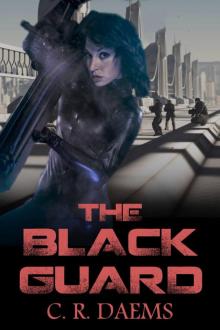 The Black Guard
The Black Guard